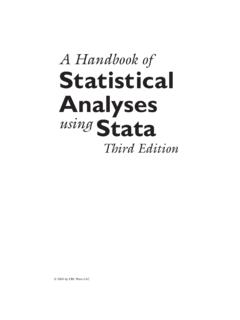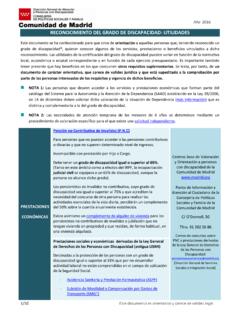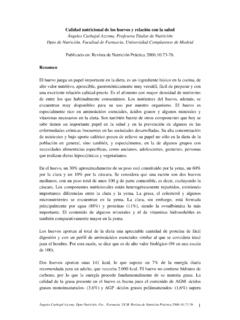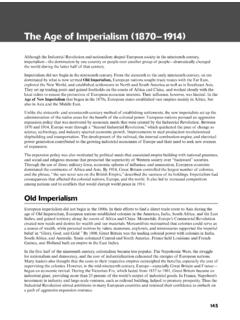Transcription of THE VICTORIAN AGE. - UCM
1 THE VICTORIAN AGE. Historical background. England was moving steadily in the direction of becoming Europe s most stable and prosperous country. The industrial revolution, the railway age, steam engines were being used in mines, factories and ships. Small towns were beginning to swell into smoky centres of mnaufacturing industry. All this was taking place under a government and legislature that were still narrowly restricted to the privileged few, who were wealthy by birth or becoming wealthy in commerce. Despite the industrial revolution, the factories, mills, mines and workshops, England was still an almost entirely agricultural country. The English countryside was a part of everyone s existence.
2 The industrial revolution, however, was just beginning to bring dirt and squalor, ugliness and crime, into the lives of the poor whom circumstances forced to live and work in the mills and factories of the new towns. Labourers were being unfairly treated without redress, women workers were also ill-treated and underpaid, while children were often overworked in abominable conditions. Society in the country was still effectively feudal. A small agricultural community was still more or less governed by the landlord or lord of the manor to whom rents were paid by tenants of farms or cottages. No one else in the rural community had much authority except for the local parson, or to a lesser extent an apothecary or surgeon.
3 Literary background. In the first half of the 19C the English became a nation of avid novel-readers. Theatres were disreputable, possibly even inmmoral. Poetry, especially Byron s was popular but people wanted stories. Women had already trimphantly demonstrated their ability to compete successfully with their brother novelists. Mrs Radcliffe (1764-1823), Fanny Burney (1752-1840), Maria Edgeworth (1767-1849), Jane Austen (1775-1817). Contributing to a rapid rise in the popularity of the novels were the growth of a moneyed, leisured and educated middle class reading public, and an increase in the number of circulating libraries. Serialization was to some extent an artisitic strain on the novelists, but many major works, particularly those by dickens , Thackeray and Hardy were first published in this way.
4 Thackeray was born in 1811, dickens in 1812 , Trollope in 1815, Charlotte Bronte in 1816, Emily Bronte in 1818, George Eliot in 1819, Samuel Butler in 1835, George Meredith in 1828 and Thomas Hardy in 1840. The novelists of the first half of the century identified themselves with their age and shared a special climate of ideas, feelings and assumptions. They accepted the idea of progress without much question. The age represented the triumph of protestantism. The taboo on the frank recognition and expression of sex had come into existence slowly. Fielding was banished. Later novelists came to question and critize and became hostile to the dominant assumptions of the age.
5 The character of scientifi discovery was seriously disturbing the 19C minds. Instead of providing evidence that the universe is both stable and transparent to the intellect, it showed the universe to be incessantly dhanging and probably governed by the laws of chance. After the publication of The Principles of Geology (1830-3) by Charles Lyell and later On the Origin of Species (1859) and The Descent of Man (1871) by Charles Darwin, many intellectuals were forced into religious disbelief, or into some form of personal religions which, though it might contain elements of Christianity, was essentially untheological. The Scottish philosopher, David Hume, in his Treatise on Human Nature, carried scepticism so far that it offered a challenge for reformulation by Immanuel Kant -a German philosopher of Scottish descent.
6 Another Scot, Thomas Carlyle (1795-1881) made German thought widely known in Britain, Goethe being the chief influence. Carlyle led a new spirit of reform, a desire for individual fulfilment and liberation, "the religion of hero worhip" or cult of great men, a reaction against the principle of laissez-faire and the utilitarianism of Jeremy Bentham and James Stuart Mill. He inspired the stream of "social problem" novels between 1830 and 1860, notably some of the best by Elizabeth Gaskell, Disraeli, and dickens . 1. THE INDUSTRIAL REVOLUTION. The Industrial Revolution is a process that began in the middle of the 18C and covers a wide period of more than a century. Britain became for the first time the richest country in the world, but at the price of being the first to encounter the immense social problems that arise from the rapid development of urban industry.
7 Transport. In the 16C the care of the roads was in charge of the country parishes, under the supervision of the magistrates, but the work was neglected. In the second half of the 17C the turnpike system was introduced to transfer the cost of road repairs on to the road users. The turnpikes were barriers across the roads at suitable places, where travellers were compelled to pay tolls before they were allowed to proceed. In the second half of the 18C roads were immensely improved by the great engineers Macadam, who invented the method of building road surfaces from broken stone, and Telford, who was also a great bridge builder. By the end of the century foreign observers acknowledged English roads to be the best in Europe.
8 For heavy transport, water was still more convenient than land and in the 16C and 17C rivers were deepened, locks were built and the first canals were dug. But again in the second half of the 18C the Duke of Bridgewater was responsible for the construction of a system of canals throughout England. However, the great revolution came with the steam-railway, which was more economical and made extensive travel possible. The formerly enclosed, regional cultures lost their self-sufficiency, so that British civilization became more uniform. But perhaps the most important effect was that railways increased the movement of population from the countryside into the town. Urban growth.
9 The Agricultural Revolution had important effects on society. The new methods of farming made it profitable as never before, but they required capital investment and large scale enclosure. Unable to adapt to the new circumstances the peasant farmer had to sell and he emigrated to the colonies or drifted to the industrial towns where there was a growing demand for labour. This rapid urban growth was of course produced by the development of new factories operating with steam power (Watt), other discoveries such as the battery (Volta) and the textile mill (Cartwright), and to the spread of the railways in the 1830s and 1840s. Growth of the economy. Economy grew from 1846 because of Free Trade.
10 Salaries were low and therefore, industries became more competitive in terms of exports. The basis for this growth were three: coal mining, iron foundry and the cotton industry. Social and political changes through literature. Britain had emerged from the long war with France (1793-1815) as a great power and as the world s predominant economy. This new status as the world s first urban and industrialized society, was responsible for the extraordinary wealthy vitality and self-confidence of the period. The juxtaposition of this new industrial wealth with a new kind of urban poverty is only one of the paradoxes that characterize this long and diverse age. The biggest social change in English history is the transfer, between 1750 and 1850 of large masses of the population from the countryside to the towns; the basic social classes were transformed from small farmers and rural craftsmen into an urban proletariat and a lower middle class of industrial employers.















